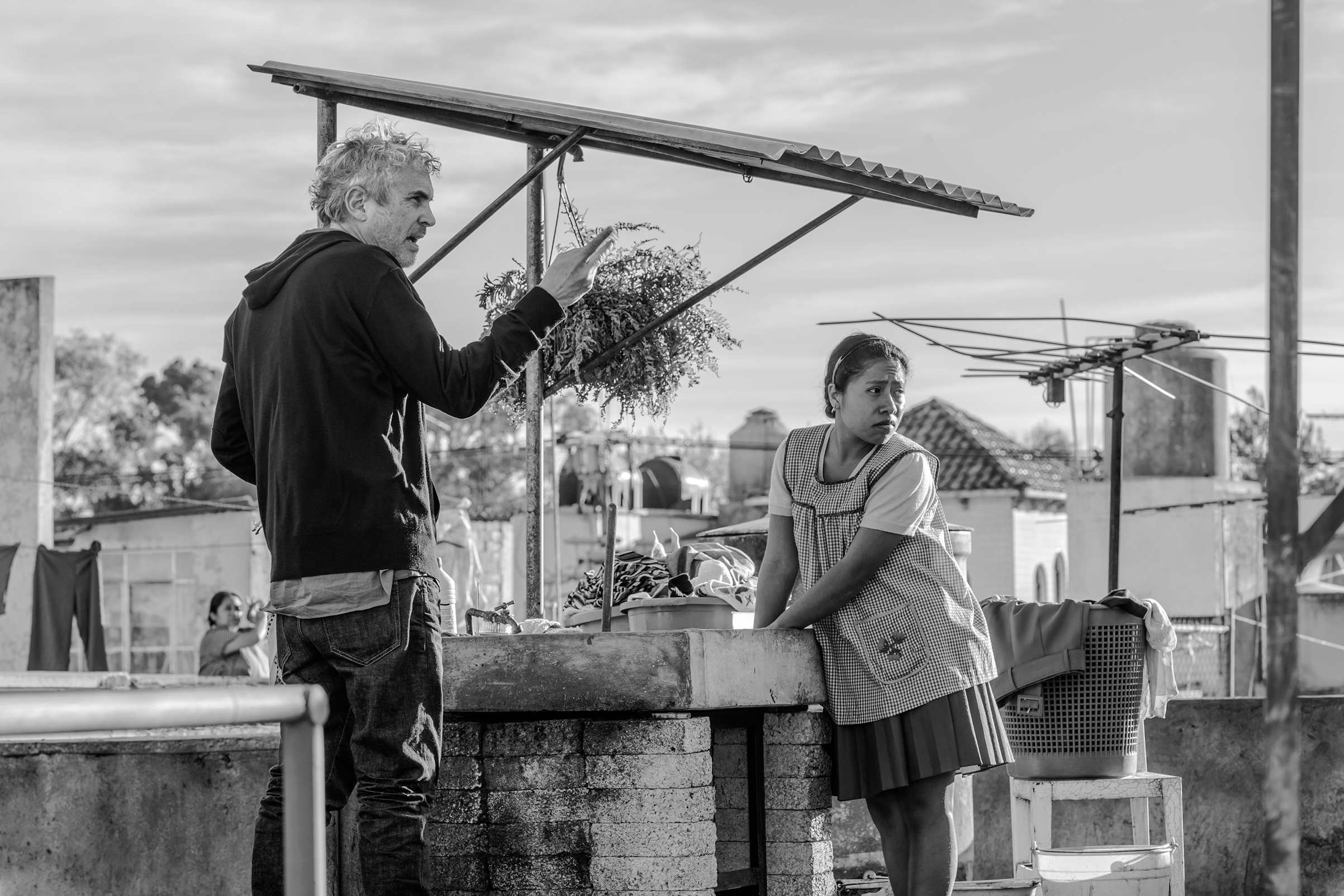Alfonso Cuarón’s Golden Globe-nominated film “Roma” gave film-viewers in 2018 the chance to have a glimpse into ordinary life of 1970s-era Mexico. His other critically acclaimed movies include the whimsical fantasy of “Harry Potter and the Prisoner of Azkaban” in 2004, the ruthless dystopia of “Children of Men” in 2006 and “Gravity” in 2014. It’s Cuarón’s latest movie, “Roma,” that stands out from his earlier productions due to how deeply personal it is, and how his audience is forced to confront the pain that the ordinary, lonely women of the film — Cleo and Sra. Sofía — battle with.
Although “Roma” is largely a memoir of Cuarón’s childhood as a young boy in Mexico City, the film does not focus solely on the experiences of him or his siblings. Instead, Cuarón chose to focus on the pain that seems to always resurface even among well-to-do families in Mexico. As a result, Cuarón’s cinematic memoir appears to audiences not as a reenactment of his childhood, but as Cuarón’s growth allowing him to better understand his family’s past pain. However, the film’s main character is not his younger self; rather, as the screenplay writer, Cuarón handed the role of the main protagonist to the indigenous housemaid that cared for him, known as Cleo (Yalitza Aparicio).
Cleo’s Suffering
Cleo appears before the film’s viewers as both a hardened woman always toiling but also as a young girl still clinging onto a her naïveté outside of work. As a working-class woman, Cleo is acclimatized to the quirks of her employer’s family. She knows how to wake up the children in the morning, that family dog Borras’ excrement needs to be cleaned every day and that the family’s excitement when their father, Sr. Antonio, arrives home from work is akin to witnessing a comet soar by the Earth.
Cleo’s work as a housemaid has noticeably transformed her into someone who’s learned to care for others more than herself, willing to withstand living in a shed with the other housemaid and being the target of bitter criticism from her employers.
However, Cleo’s naïveté is what brings her to confront newer, sharper form of suffering. Her relationship with Fermín (Jorge Antonio Guerrero), a self-important martial artist, leads to an unplanned pregnancy. After abandoning her in a movie theater after hearing the news of her pregnancy, Fermín cuts all contact with Cleo. Out of desperation, one day Cleo clarifies to him that the baby is indeed his. However, Fermín responds by threatening to hurt her and her baby if she reaches out to him again. Facing Fermín’s violent words and his indifference to her dilemma, she stands silently still. Both she and the audience watch Fermín running off into the distance where his rowdy friends wait for him.
For a significant portion of “Roma,” Cleo remains pregnant and alone. The only help she receives is from Sra. Sofía, the matriarch of the family that has employed her. However, Cleo’s pain quickly flares. After a stressful labor and delivery, her baby is revealed to be a stillbirth. In the scene of the hospital, Cuarón’s camera lingers on Cleo’s profile, as she weeps and as the doctors in the background wrap the body of her dead child in white medical cloth. In a single, lengthy take, Cuarón unflinchingly forces his audience to immerse themselves in Cleo’s shock and grief.
Rather than simply evoke pity for Cleo in her suffering, Cuarón’s direction allows the audience to experience much more. His lengthy camera shots and Aparicio’s solemn performance guide the audience to internalize a portion of Cleo’s pain within themselves. For the duration of the film, audience members are forced to not disconnect themselves from the pain of others but rather realize the extent of ordinary human empathy.
Sra. Sofía’s Pain
Sra. Sofía’s (Marina de Tavira) story as another woman confronting obstacles remains another one audience members become more conscious of as the film progresses. Unlike Cleo, Sofía lives a relatively comfortable life in her role as a middle-class mother and part-time as a professor. The privileges Sofía enjoys are some that Cleo’s has hardly enjoyed. Yet, both female characters suffer the consequences of men leaving them lonesome when they are at their most vulnerable.
At the beginning of the film, Sofía’s husband is seen absent most of the time. She remains having to look after her children and her large house by herself with only the assistance of her two housemaids, Cleo and Adela. Whenever her husband does arrive home, his demeanor is undeniably cold and harsh with her. The audience later learns that Sofía’s husband in his conference trip to Quebec was actually informally leaving Sofía and the rest of his family. Following his departure, Sofía is left with having to financially support her children and to have to live with the burden of knowing her husband is still living in Mexico City with another woman.
From having her ex-husband repossess most of the furniture in their home to having to console her children crying at a restaurant table for fear of their father not loving them, Sra. Sofía struggles to maintain the stability of her family and her own emotional well-being. Even Cleo is left in shock when she and Sofía’s children run into Antonio with his new lover one night. In her attempt to come to grips with this new reality, Sofía cries in her own home, lashes out at her children and must live with the stigma of being a divorced woman in 1970s-era Mexico.
By focusing on the middle-class mother’s suffering as a woman, “Roma” shows how the pain that women face throughout their lives is not unique to working-class or indigenous women. In reality, Cuarón seems to be persuading his audience that much of the sense of hopelessness that engulfs women is universal.
The audience can see the universality of women’s pain by witnessing how Cleo and Sofía become closer to one another, forming a new bond through shared pain. Sofía’s separation and Cleo’s stillbirth threatened to ruin both women’s chances of having familial joy. Yet, by leaning in onto one another, the two were able to preserve what little they had left of family unity, despite the men in their lives abruptly vanishing. Cuarón’s memoir is a harsh, but honest, testament of the turmoil that women endure in their lives — but also their ability to overcome it.
Though American movie theaters are no longer screening “Roma,” Netflix is currently streaming the movie for its subscribers around the globe. Nominated for best foreign language film, best director and best screenplay for the 2019 Golden Globe awards, Cuarón’s “Roma” and its message on the suffering of women have received endless praise in both his home country of Mexico and abroad.
















